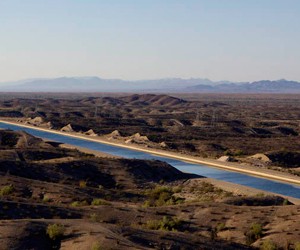Federal Water Tap, December 17: The Water-Food-Energy Megatrend
The increasing demand for water, food, and energy is one of four “megatrends” that will shape the next 15 to 20 years, according to a National Intelligence Council report that looks at the forces creating “tectonic shifts” in how the world works. Many countries will not be able to avoid food and water shortages without “massive” outside help, the report argues.
The other megatrends are: individual empowerment via rising incomes and technological innovation; diffusion of power among countries; and demographic patterns such as aging societies, migration, and urbanization.
EPA Water-Climate Strategy
The Environmental Protection Agency released its strategy for dealing with climate change’s effects on water resources, a comprehensive plan that includes 53 items of emphasis, including monitoring, forecasting, assessing, adapting, and collaborating with local, state and tribal partners.
The agency already has programs in place for many of its recommendations, which fall into five categories: infrastructure, watersheds and wetlands, coastal waters, water quality, and tribal relations. The document builds upon the first water-climate strategy, published in 2008.
Fracking Rule Delay
Because of the volume of comments it received, the Interior Department has delayed its rules for hydraulic fracturing on federal lands, Reuters reports. The department submitted draft rules in May that would require companies to disclose the chemical they used, but only after they have finished drilling.
Coal Export Hearing
The Army Corps of Engineers and its state and local partners held their final public meeting Thursday in Seattle before starting the environmental review of a coal export terminal planned for Cherry Point, Washington, just south of the Canadian border. The Seattle Times reports that more than 2,300 people attended.
Evidence that Gold is Valuable
The Army Corps of Engineers will begin the environmental assessment process for a gold mine in western Alaska. The open pit mine, expected to produce ore for 27 years, will be 3.5 kilometers (2.2 miles) long, 1.6 km (1 mi) wide, and deep enough to bury the Empire State Building with room to spare. Donlin Gold, the developer, will build a 500-km (313-mi) natural gas pipeline to supply an on-site power plant. The corps will hold public meetings in Alaska in early 2013.
Great Lakes Water Levels
The National Oceanic and Atmospheric Administration (NOAA) unveiled an interactive chart that shows historical water levels in the Great Lakes as far back as 1860. Water level forecasts are also featured.
In August, Circle of Blue reported on the problems that low lake levels are causing shipping companies and ports.
Solar Protection
The Bureau of Reclamation is shielding more than 300,000 acres in six western states from mining claims in order to protect the land for solar energy development. This revised proposal cuts the number of acres protected but extends the length of protection from 5 years to 20 years. Earlier this year the Obama administration created 17 priority zones in those same six states — Arizona, California, Colorado, Nevada, New Mexico and Utah — for solar development.
Calls for Experts
NOAA is looking for some public servants to review the draft National Climate Assessment, which comes out next year. Instruction for how to nominate a reviewer — you can even nominate yourself — can be found here.
The EPA wants experts for a technical workshop related to its study of how hydraulic fracturing affects drinking water. The workshop, the first of several, focuses on chemical analytical methods.
Federal Water Tap is a weekly digest spotting trends in U.S. government water policy. To get more water news, follow Circle of Blue on Twitter and sign up for our newsletter.
Brett writes about agriculture, energy, infrastructure, and the politics and economics of water in the United States. He also writes the Federal Water Tap, Circle of Blue’s weekly digest of U.S. government water news. He is the winner of two Society of Environmental Journalists reporting awards, one of the top honors in American environmental journalism: first place for explanatory reporting for a series on septic system pollution in the United States(2016) and third place for beat reporting in a small market (2014). He received the Sierra Club’s Distinguished Service Award in 2018. Brett lives in Seattle, where he hikes the mountains and bakes pies. Contact Brett Walton





Leave a Reply
Want to join the discussion?Feel free to contribute!